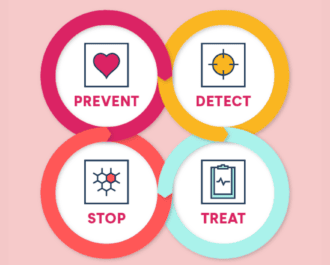
Researchers from Flinders University in South Australia will shortly commence a study to develop improved cardiovascular clinical care pathways for women with breast cancer.
Treatment for breast cancer can significantly increase the risk of heart disease but, until now, the two diseases have been treated separately. Unfortunately, it is often a challenge for women undergoing cancer treatment to also regularly see a cardiologist. Hence, the new study will develop an improved framework to provide women with cardiovascular risk management as part of their cancer care.
Over the next two years, the NBCF-funded project will bring together cancer, cardiology and nursing experts, to develop the framework. In this model, specially-trained nurses will monitor cardiac health and provide risk management for women undergoing breast cancer treatment.
Study Investigator Professor Derek Chew, Head of Cardiology at the Southern Adelaide Local Health Network, explains that the project aims to fill a current gap in patient management.
“Cancer specialists are not always skilled in managing risk factors for cardiac disease, and general practitioners may not be aware of the potential for cardiotoxicity caused by cancer treatment,” he said.
The study is being led by Professor Bogda Koczwara from the Cancer Survivorship Research Group at the Flinders Centre for Innovation in Cancer. She is excited about the broad potential application of this model of care, which will hopefully be implemented both across Australia and internationally.
“The issue of heart disease after cancer is becoming more recognised around the world, so much so that there is a new discipline evolving called cardioncology,” Professor Koczwara said. “There are emerging guidelines of what should be done, but not a lot of direction of who should do it.”
Professor Koczwara stressed that although there are currently guidelines for managing cardiovascular disease during cancer treatment, these tend to focus only on cancer-related risks. However, many other cardiovascular risk factors can be reduced by lifestyle interventions.
“People can decrease their risk of cardiovascular disease through losing weight, eating a healthy diet, getting enough exercise and possibly taking medication,” said Professor Koczwara. “Neglecting these represents a missed opportunity for better outcomes in terms of cancer and cardiovascular disease.”
Nurses are exceptionally well placed to provide counselling and advice on these lifestyle interventions, says Professor Robyn Clark (Flinders College of Nursing and Health Sciences).
“The outcome of our study will be a practical model, led by nurses, which will facilitate a safe journey through cancer treatment and give breast-cancer survivors every opportunity to significantly reduce their risk of heart disease,” she said.
“We’ll also be evaluating the model’s impact on actual health outcomes – including quality of life, and cardiac events.”
With the support of our donors, NBCF are proud to be funding this important study, which will provide improved outcomes for women with breast cancer in the future.
More News Articles
View all News



